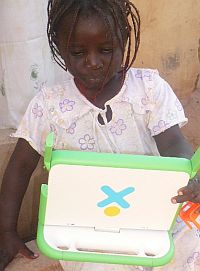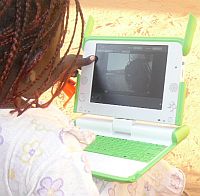Please eXOnerate me if I eXude eXOrbitant eXuberance about my XO, but I have reason to believe that I should be happy as [probably] the first owner of an XO in Darfur.

One Laptop Per Sudanese Child
I have been following the One Laptop Per Child project for over 2 years now, while working in development-oriented NGO's across the Sahel, first converting to Ubuntu to gain greater familiarity with the Linux environment, and then vowing that my next computer would be from OLPC.
Happy if Lonely XO
So I was not going to let the "available only for purchase in North America" clause keep from getting a little green machine, though it was delayed by a couple weeks as I waited for a reliable courier to hand deliver it, as I couldn't be sure about the international courier system.
I couldn't be more pleased with my XO, though I am probably the only XO within about 2000 km, which is a bit too far to mesh, even with this things clock stopping hot technology (so any re-gifters out there, feel free to facilitate some of my ideas for testing out mesh networking with Darfur's refugees and IDP's).
I was disappointed to hear that the G1G1 laptops wouldn't have alternative power sources, but I will have to find my own solution for that next week when I go out into a rural area - I am thinking solar power should do it. The next challenge will be to figure out whether I can get the Thuraya satphone GmPRS service to connect me to the internet when I am in the middle of nowhere.
But why am I so interested in the OLPC, when some of the harshest critics are the development junkies, who believe it is absurd to put a computer in the hands of a child who is malnourished, has no school, or lives under an oppressive regime? In fact, I think one of the most legitimate and believable critiques of the whole OLPC endeavor is that the people involved may be innovative and technologically brilliant, but that they don't have real experience with long-term development.
They could create a brilliant little machine, but if it isn't easily accessible as an interactive learning tool, the only result will be that a few intelligent kids that otherwise might not have had access or opportunity to display/develop their ability, will emerge as prodigies. The vast majority, however, will get minimal benefit from the tool's incredible potential, because the deployment plan depends on an existing educational infrastructure that is both flexible and progressive, which happens not to be in place in many countries, developing or not.
OLPC Has Relevance
Nonetheless, I think if people who have deeper experience in development get involved, we could bridge the gap between the clock-stopping hot technology and the teachers and children in their communities who may be lucky if they are getting pencils and paper. I believe development is about living with people, understanding the problems they face, and enabling them to overcome those problems primarily through strategic leveraging of their own resources.

Lois likes her XO laptop
The XO clearly doesn't fit into this paradigm in that it was a crazy dream cooked up by Negroponte - but it does provide a tool which can enable communities to leverage the educational and intellectual resources they do have in an optimal way, and it can help them to get the resources they deserve from their governments by simplifying the system of distribution of educational needs.
Rather than a long process of procuring desks, pencils, paper, textbooks, etc. (for which, at each step of the way there can be an alarming rate of waste, loss, corruption, theft, or deception) there is one tool which each child gets, and includes pretty much everything they would need.
This is not going to stop the fact that children are hungry, and if the extent of their malnutrition is such that they are developmentally challenged to the point that the XO is useless to them, then obviously alimentary relief is in order, but I would say that most of the malnutrition I have seen in my work in the Sahel comes from ignorance about balanced diet, and mismanagement of water resources (so you see toddlers eating only white rice, a water-hog of a crop grown in the desert). For this type of hunger and malnutrition to stop on a societal level it has to be learned and discovered, and shared throughout the community.
I think the XO, if distributed, deployed, and integrated properly into the educational and societal systems of developing countries, has a better shot than anything else I have seen to end hunger and poverty.
"Khawaji" would like to stay anonymous in order to avoid any misunderstandings with the Sudanese government and its unpredictable reactions toward NGO's and specific development projects.


Hmm. A friend of mine wrote a book about a company 100 years ago that made ruggedized suitcase-packed foot-pumped reed-organs for missionaries and military chaplins.
Maybe we need an "XO Missionary" bundle -- a backpackable padded case with... what? a dozen XOs and charging systems, a flash MP3 player with instructions in a few languages, some crank-charged battery-powered speakers for group listening, flash drives, etc.... Pre-packed for donation to entrepreneurial Johnny Appleseed style evangelist-constructivist educators.
Crazy impractical idea... but what would they need for a "classroom in a bag"? Could make for a smaller scale "give a bagful" program... Guerilla marketing meets guerilla pedagogy?
OK, that's enough coffee for today...
Khawaji, Ignorance is the enemy we are all fighting.
Malnutrition and lack of knowledge of farming is becoming epidemic. The older men who should have passed on knowledge are dying of Aids.
Very few westerners have any concept of life in Africa. Unprotected sex and promiscuity is quickly killing Africa. Access to knowledge and early learning techniques may yet save many millions of lives in the next 20 years. If women understand how important condoms are and learn about important food groups for both themselves and their children we may see a better Africa one day.
I'm lucky to have firsthand knowledge from my daughters Kenyan partner living here in Australia. He has seen the dark side of the African people and knows how much good can be saved if only the children and parents can be educated to understand basic knowledge we take for granted.
//For this type of hunger and malnutrition to stop on a societal level it has to be learned and discovered, and shared throughout the community.//
xo shares video.. true? if so, then xo just starts to connect we the richest and poorest on earth, live on tv, peer to peer cozy, starting with kids.. if so, maybe we have chance to bust out of our monkeyshperes and narrow the digital divide.. powerful potential.
then again, in 1990's John Gage said: "What stopped the vietnam war was we told the truth about what was happening. Now the truth telling mechanisms are a thousand times more powerful".. sounds great, but look what happened: the trwtf telling mechanisms of today have sold a war with no end.. sold it with lies.. victims unknown.. to control oil.
meanwhile, back in the states, mcdonald's now has adverts on florida school report cards.. i visited a us school recently where general assembly was like a big commercial.. so thanks to xo for learning without commercials.
back on topic, even if xo is even just testing in torn societies, then more witness and connection across divide happens.. xo kids already connect today in same "neighborhoods" but different continents.. these connects seem so more friendly than mass media barrages.. and maybe growing up with xo youngsters will also share valuable information which, as Robert points out, we take for granted.. like maybe even getting the chance to learn how to read.
Here is a link to the McDonald's Report Card mentioned by "duke" above:
http://www.commercialfreechildhood.org/pressreleases/ronaldmcdonald.htm
I hadn't heard about it before and thought it was interesting.
I hope this helps people in remote areas. I can provide more information if you will write me at minifarms@gmail.com
Access to low cost technology
Photo Patrick Kamoyani
Patrick uses a 12 volt car battery with an inverter which increases the power supply from 12 volts to 240 volts – the
equivalent of mains power. He runs a laptop computer, printer and mobile phone from this. The battery lasts four to five days and he then gets it recharged in a nearby shop. He has a dial-up connection between his mobile phone and laptop and uses Bluetooth wireless technology. This means he can use his mobile phone connection to access the internet on his laptop. He finds this is much cheaper than using internet cafes. Eventually he hopes to be able to afford a solar panel to charge his car battery at home. Patrick provides a great example of how people in a remote area can benefit from technology.
Patrick lives in Western Kenya in a remote village with no electricity or landline telephone. His home, which he also uses as an office, is very simple, but he is able to use up to date technologies. He produces KiSwahili translations of development publications for a website. Footsteps www.tearfunds.org/tilz
Patrick Bunyali Kamoyani Western Kenya Email: pbkamoyani@myway.com
I would have supported the ideal but I have I do not know these competure is they will used as they learn in class yet they are not peace and they lock what to eat yet you to have this sto them, i would otherwise adcixe that ias much as you plan for them to have that modernized education please try to attend to you basic needs then then the rest woill follow
God bless you
Bernard
Child mission -Jinja uganda
it looks smart.
how can we purchase it as a foreigner?
Sorry, cell. OLPCs for sale were only available in the US. Try ebay.com, expect to pay over $400 a piece plus shipping.
Bernard, I agree with you. Reading this article - and knowing a bit about the situation in Darfur, the first thing that came up in my mind was - "is this really the most important thing we can give them right now?".
if you ask me, this is insulting. If you don't have anything to eat, and you've been through horrible events and you are poor and sick, I don't see how this technology will help you. you wouldn't even have the time to start learning how to use it!
http://conspil.com/
Honestly i live in Kenya i have seen the IDPs ,i have seen people die of Aids, have seen poor people in the Slum areas how does technology help unless it resolves some of the issues at hand first.